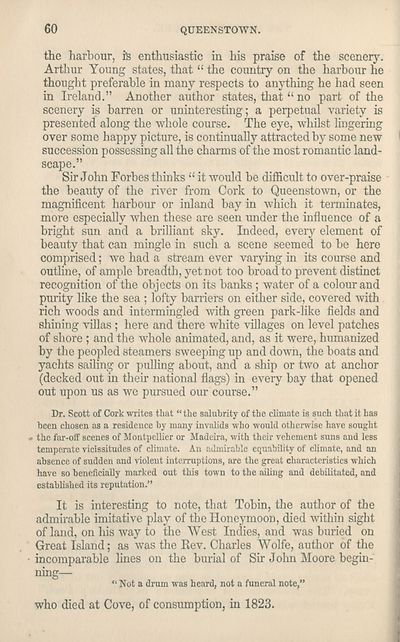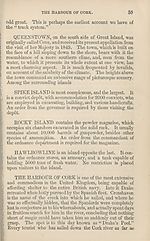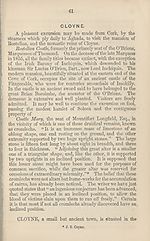Download files
Complete book:
Individual page:
Thumbnail gallery: Grid view | List view

QUEENSTOWN.
the harbour, fe enthusiastic in his praise of the scenery.
Arthur Young states, that “ the country on the harbour he
thought preferable in many respects to anything he had seen
in Ireland.” Another author states, that “ no part of the
scenery is barren or uninteresting; a perpetual variety is
presented along the whole course. The eye, whilst lingering
over some happy picture, is continually attracted by some new
succession possessing all the charms of the most romantic land¬
scape.”
Sir John Forbes thinks “ it would be difficult to over-praise
the beauty of the river from Cork to Queenstown, or the
magnificent harbour or inland bay in which it terminates,
more especially when these are seen under the influence of a
bright sun and a brilliant sky. Indeed, every element of
beauty that can mingle in such a scene seemed to be here
comprised; we had a stream ever varying in its course and
outline, of ample breadth, yet not too broad to prevent distinct
recognition of the objects on its banks; water of a colour and
purity like the sea ; lofty barriers on either side, covered with
rich woods and intermingled with green park-like fields and
shining villas ; here and there white villages on level patches
of shore; and the whole animated, and, as it were, humanized
by the peopled steamers sweeping up and down, the boats and
yachts sailing or pulling about, and a ship or two at anchor
(decked out in their national flags) in every bay that opened
out upon us as we pursued our course.”
Dr. Scott of Cork writes that “the salubrity of the climate is such that it has
been chosen as a residence by many invalids who would otherwise have sought
. the far-off scenes of Montpellier or Madeira, with their vehement suns and less
temperate vicissitudes of climate. An admirable equability of climate, and an
absence of sudden and violent interruptions, are the great characteristics which
have so beneficially marked out this town to the ailing and debilitated, and
established its reputation.”
It is interesting to note, that Tobin, the author of the
admirable imitative play of the Honeymoon, died within sight
of land, on his way to the West Indies, and was buried on
Great Island; as was the Rev. Charles Wolfe, author of the
incomparable lines on the burial of Sir John Moore begin¬
ning—
“ Not a drum was heard, not a funeral note,”
who died at Cove, of consumption, in 1823.
the harbour, fe enthusiastic in his praise of the scenery.
Arthur Young states, that “ the country on the harbour he
thought preferable in many respects to anything he had seen
in Ireland.” Another author states, that “ no part of the
scenery is barren or uninteresting; a perpetual variety is
presented along the whole course. The eye, whilst lingering
over some happy picture, is continually attracted by some new
succession possessing all the charms of the most romantic land¬
scape.”
Sir John Forbes thinks “ it would be difficult to over-praise
the beauty of the river from Cork to Queenstown, or the
magnificent harbour or inland bay in which it terminates,
more especially when these are seen under the influence of a
bright sun and a brilliant sky. Indeed, every element of
beauty that can mingle in such a scene seemed to be here
comprised; we had a stream ever varying in its course and
outline, of ample breadth, yet not too broad to prevent distinct
recognition of the objects on its banks; water of a colour and
purity like the sea ; lofty barriers on either side, covered with
rich woods and intermingled with green park-like fields and
shining villas ; here and there white villages on level patches
of shore; and the whole animated, and, as it were, humanized
by the peopled steamers sweeping up and down, the boats and
yachts sailing or pulling about, and a ship or two at anchor
(decked out in their national flags) in every bay that opened
out upon us as we pursued our course.”
Dr. Scott of Cork writes that “the salubrity of the climate is such that it has
been chosen as a residence by many invalids who would otherwise have sought
. the far-off scenes of Montpellier or Madeira, with their vehement suns and less
temperate vicissitudes of climate. An admirable equability of climate, and an
absence of sudden and violent interruptions, are the great characteristics which
have so beneficially marked out this town to the ailing and debilitated, and
established its reputation.”
It is interesting to note, that Tobin, the author of the
admirable imitative play of the Honeymoon, died within sight
of land, on his way to the West Indies, and was buried on
Great Island; as was the Rev. Charles Wolfe, author of the
incomparable lines on the burial of Sir John Moore begin¬
ning—
“ Not a drum was heard, not a funeral note,”
who died at Cove, of consumption, in 1823.
Set display mode to:
![]() Universal Viewer |
Universal Viewer | ![]() Mirador |
Large image | Transcription
Mirador |
Large image | Transcription
| Antiquarian books of Scotland > Ireland/Irish > Black's guide to Killarney and the south of Ireland > (72) |
|---|
| Permanent URL | https://digital.nls.uk/118861532 |
|---|
| Description | Thousands of printed books from the Antiquarian Books of Scotland collection which dates from 1641 to the 1980s. The collection consists of 14,800 books which were published in Scotland or have a Scottish connection, e.g. through the author, printer or owner. Subjects covered include sport, education, diseases, adventure, occupations, Jacobites, politics and religion. Among the 29 languages represented are English, Gaelic, Italian, French, Russian and Swedish. |
|---|

